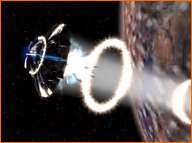Using multiple units in a scenario is a little trickier. You will have to
do some editing of the configuration files yourself in this one. However,
this is not too difficult, and is explained in this section.
Before we get started, I will just run through a very brief introduction
on how the configuration files work. For a much more detailed description,
you will need to download the
Tactics Engine Manual.
By default, the configuration files are read of out $GAME\DEFTXT. These
files are used in all the single player missions, and are the default
configuration files for any scenarios that you create. However, if you wish
to use custom configuration files for any particular reason (for example,
playing with all the new units and buildings from our site) you can place
these files in the scenario directory itself, and the game will read them
rather than the ones in $GAME\DEFTXT.
If you open the $GAME\DEFTXT, you will see it contains a set of text
files. These are the configuration files for the game. They are in standard
ASCII text format, so you can use any text editor to customise these.
The text files contain a definition of everything that is in the game -
units, buildings, overlays, animations. UNITS.TXT, for example, houses all
the information about the units. If you have a look at that file in WordPad,
you will see each unit has its own section.
To use a new unit, basically all you need to do is add the required
information into the UNITS.TXT file. When you run the batch file that comes
with the new units, it simply copies a new UNITS.TXT file into the scenario
folder (for example in the case of the new Hover Assault Tank
$GAME\SCENARIO\SINGLE\HOVER). This file differs from the main one in
$GAME\DEFTXT only in that it has a new unit definition right at the bottom.
In fact, each new unit you download only has one new section in
UNITS.TXT. So, say you want to make a new scenario that has all these new
units in them (or modify an existing scenario, or even modify the master
text files). First of all, create the scenario, or locate the one that you
wish to edit. Copy the file UNITS.TXT out of $GAME\DEFTXT into this
directory. Then, open your favourite text editor, and for each of the new
units, browse right down to the end of the UNITS.TXT file that comes with it.
The last unit definition in each one is all you need. Then, copy this
section and paste it into the new UNITS.TXT that you copied into the
scenario directory. So, what you end up with is a new UNITS.TXT, that has the
same amount of new definitions in there as there are new units you want :)
So, basically, all you need to do is grab each of the new sections in
these files and copy them into another UNITS.TXT file, right?
The Packfile Manager file
Almost right :) There is one other step, and that is setting up the
Pack Manager Configuration File. This is fairly straight forward. The sprite
files for the new units are placed in $GAME\addon\(UNITNAME), and need to be
referenced in the PACKMAN.CFG so that the game knows to load the sprites.
PACKMAN.CFG works by loading the config file that is in the ADDON
directory, thus enabling access to the sprites in the packfiles.
As a
result, for each different unit (and thus different packfile) that you wish
to put in the game, you need to add it into the PACKMAN.CFG file. Additional
packs get added by appending the path on the end of the first string, like
so:
[sprites]
pack=$GAME\addon\hover\hover.ftg,$GAME\addon\demolit\demolit.ftg
The master PACKMAN.CFG is located in $GAME; you can actually define these
sprites in the [sprites] section in this file if you wish them to be loaded
for ALL scenarios. (Note however, that this will only load the sprites into
memory, it will not make them active in the game - you still need to do all
the text file stuff for that!)
Installation of multiple buildings.
To install multiple buildings, you simply follow the same procedure as
above - however, you have to do it for more files. A building has more files
associated with it than a unit. For example, the Pulse Blaster has changes in
the following files: ANIMATE.TXT, BUILD.TXT, OVLEFF.TXT, UNITS.TXT and
WEAPON.TXT!
All the changes are, as with the units, right down the bottom of the
text files. So, in the case above, you would need to just grab the last
section out of each of the files, and copy and paste that into a new file of
the same name.
Buildings are a little trickier, as you have to keep track of many
sections in many files. Be careful you grab the right section!
Common files.
One file is common to both buildings and units: MLSTRING.CFG. This is the
file that contains the names that appear for every unit in the game. This
file is located in $GAME\LOCAL.
Again, for each new thing that you want to appear in your scenario, you
need to create a new MLSTRING.CFG file and copy the changes that have been
made from the MLSTRING.CFG in the new units/buildings directories.
To summarize, there are three main steps you need to do when putting the
new units and buildings into scenarios:
Copying and pasting the relevant sections from any changed
text files into new text files.
- Creating a PACKMAN.CFG in the scenario folder that points to any new
graphics packs you need to load.
- Creating a new MLSTRING.CFG that has the new entries for the new
units/buildings.
